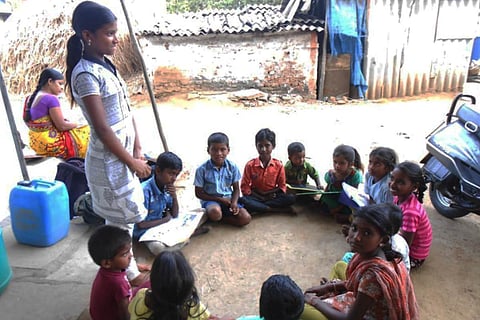

On September 13, an important discussion was held among the children from the Singareni colony basti in Hyderabad, the same area where a 30-year-old man allegedly raped a six-year-old and murdered her on September 9. In their ‘Children’s Parliament’ meeting, the students decided that the toddy compound in that area should be removed and that a police van should patrol every hour to prevent any kind of crimes happening in the locality.
“The crime incident has triggered us,” says Jayalakshmi, an intermediate student, who is elected as the ‘Prime Minister’ for this parliament and is also a resident of the colony. During the discussion, the group talked about the UN SDG-5, a roadmap on how to establish a sustainable future. The group also covered gender equality, and saw the need to address the way in which brutal crime is portrayed in the media. The children say that instead of ‘she was raped’, it should be reported as, ‘a man raped her’ and when the public advises ‘protect their daughters’, the children urge that this change to ‘educate your sons’.
All this came about due to The Hyderabad City Children’s Parliament, an initiative started by the Montfort Social Institute (MSI), a non-government organisation based in the city that works with vulnerable communities. Through this programme, they initiate discussions with children about various ongoing issues in society, with the help of mentors. Children between the ages of 6 and 18 are allowed to take part in these discussions.
According to the team, the Children’s Parliaments operate through a system of governance called ‘sociocracy’. “Sociocracy is an idea of governance based on consent, that seeks to include the voice of every individual in the community. Elections are held in Children’s Parliaments following this method, which requires the consent of every individual who is part of the group to be elected as a leader. Likewise, in the meetings, we ensure that every participant gets a chance to speak during discussions,” they say.
Jayalakshmi, was elected as the Prime Minister when she was in class 9. Her Parliament is held with a Speaker and 30 ministers. The sessions are conducted at the Hyderabad-level once every 15 days, and discuss points which are based on 17 sustainable goals. Once the discussion is done, children, with the help of MSI members, submit their resolutions to the concerned officials in the state government.
Jayalakshmi says that these discussions have helped the children understand society better and bring awareness to them. “Now I have a vision and a purpose in my life. Coming from a family of sanitation workers, all I used to do was collect garbage with my family in the morning and go to school. But after being part of the Children's Parliament, I feel empowered as I am getting a better understanding of things,” says Jayalakshmi, who aims to become an IAS officer in the future.
In the recently held Hyderabad-level meeting, there was also a discussion on the lack of breakfast for children in schools, and the Parliament passed a resolution in this regard. Jayalakshmi then met with Divya Devarajan IAS, Special Secretary of the Women Development and Child Welfare Department, and presented their requests.
“The first was to establish anganwadis in 21 slums, as they do not have them in those areas. The second was to start a pilot project to provide breakfast to children in 56 slum communities through their local anganwadis. Both requests have been agreed upon, with the breakfast project set to begin by Dasara festival in the month of October,” MSI says.
Speaking to TNM, Jayalakshmi says that many of their requests are positively received by the government, and are resolved too. “In one of our meetings, we submitted a request about the mosquito menace in Domalguda to the then Greater Hyderabad Municipal Corporation (GHMC) Commissioner Dana Kishore, and soon arrangements were made to solve our issue. Likewise, we get positive responses from many officials, but at times some requests are delayed,” MSi says.
While the city-level Children’s Parliament is held once in 15 days, at the basti-level, the children living in colonies meet almost every day, and discuss the issues that are happening in society.
The people at MSI believe that children are not just the citizens of the future, but are citizens of today as well, and they should be involved in decision making and be aware of the happenings of the world.
Brother Varghese Theckanath S G, the Director of MSI, says that the Children’s Parliament started in the year 2014 as a part of the Neighborhood Community Network. “Any decision that impacts them (the children) should also involve them. They should know about democracy and this decision-making power empowers them,” he says.
He further adds that MSI already works with residents of around 200 bastis, and is closely associated with the people living there. “Since many of the people in these areas do not have proper space to study, we have facilitated an educational centre, where students can come and study. Through this, the idea of the Children’s Parliament was also introduced, for which children have actively come onboard,” he says.
So far, the Montfort Social Institute has reached 22,610 children through their initiatives. It runs Children’s Parliaments in 10 slums in Hyderabad, 10 in Vijayawada and in 56 residential schools run by the Tribal Department of Maharashtra, according to data provided by MSI.